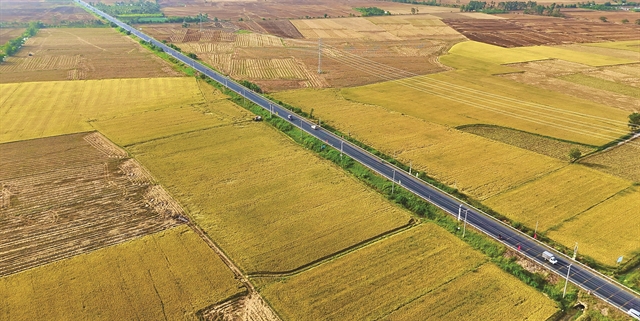Vietnam’s One-Million-Hectare Rice Project Achieves Promising Results in Mekong Delta

Mekong Delta, The Gulf Observer: Vietnam’s ambitious one-million-hectare rice project has recorded significant progress, with cooperatives playing a central role in promoting high-quality, low-emission rice cultivation and advancing the country’s green growth strategy.
Approved by the Government in November 2023, the project — officially titled “Sustainable Development of One Million Hectares of High-Quality, Low-Emission Rice Associated with Green Growth in the Mekong Delta by 2030” — is designed to address long-standing challenges in the country’s rice sector. These include climate change impacts, land degradation, market fluctuations, and commitments to reduce greenhouse gas emissions.
The Mekong Delta, often referred to as Vietnam’s “rice bowl,” cultivates around 3.8 million hectares annually, producing more than half of the nation’s rice and nearly 90 percent of its exports. However, inefficient practices in handling rice straw — with only 30 percent collected for reuse and the rest burned or buried — have contributed to pollution and high methane emissions.
The project aims not only to restructure rice farming toward sustainability but also to raise farmers’ incomes, safeguard food security, and support Vietnam’s pledge to achieve net-zero emissions by 2050.
During the 2024 summer-autumn crop, the Ministry of Agriculture and Environment (formerly the Ministry of Agriculture and Rural Development), in collaboration with local authorities and the International Rice Research Institute (IRRI), implemented seven pilot models across the delta. Each pilot covered 50 hectares and delivered remarkable outcomes.
Farmers reported cost reductions of 20–30 percent through halving seed use, reducing nitrogen fertilizer by 30 percent, cutting pesticide applications by two to three times, and saving 30–40 percent in irrigation water. Yields rose by 10 percent to 6.3–6.6 tonnes per hectare, while contract farming arrangements ensured rice was sold at VNĐ200–300 (0.7–1 US cent) above market prices.
As a result, farmers’ incomes increased by 20–25 percent, with profits rising by VNĐ4–7.6 million (US$150–290) per hectare.
Cooperatives have been at the heart of these successes, leading the implementation of pilot models and helping to expand farmer participation. Their role is considered crucial to scaling up the initiative toward its 2030 targets.
Officials and researchers noted that the project represents a transformative step in Vietnam’s rice sector, combining sustainability with higher value and competitiveness in global markets.


